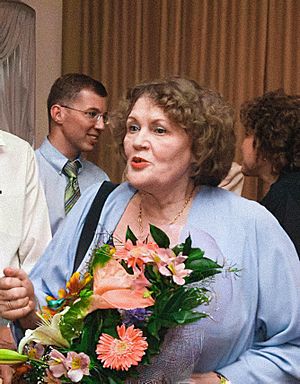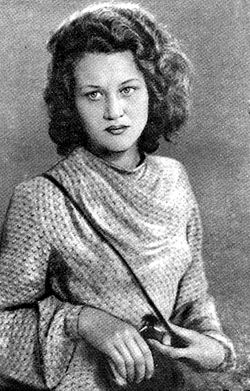Lina Kostenko facts for kids
Quick facts for kids
Lina Kostenko
Shevchenko National Prize laureate
L.d'H. Chevalier |
|
|---|---|

Kostenko in 2006
|
|
| Native name |
Ліна Костенко
|
| Born | 19 March 1930 Rzhyshchiv, Kyiv okruha, USSR (present-day Ukraine) |
| Occupation | |
| Language | Ukrainian |
| Genres |
|
| Literary movement | Sixtiers |
| Years active | 1957–present |
| Notable works |
|
| Notable awards |
|
Lina Kostenko is a famous Ukrainian poet and writer. She was born on March 19, 1930. She is known for her beautiful Ukrainian poems and for being a brave person who spoke out against the Soviet government. Many people consider her one of Ukraine's most important poets. She helped bring back Ukrainian-language poetry.
Lina Kostenko has received many awards. These include special honors from universities and the Legion of Honour from France.
Contents
Early Life and Education
Lina Kostenko was born in a town called Rzhyshchiv in Ukraine. Her parents were both teachers. In 1936, her family moved to Kyiv, the capital city of Ukraine. There, she finished her high school education.
From 1937 to 1941, she went to school #100 in Kyiv. This school was on Trukhaniv Island, where her family lived. Sadly, the school and the whole village were burned down by Nazi forces in 1943 during World War II. Lina Kostenko wrote a poem called I Grew Up in Kyivan Venice about these events.
After high school, she studied at the Kyiv Pedagogical Institute. Later, she went to the Maxim Gorky Literature Institute in Moscow. She finished her studies there with excellent grades in 1956.
The Sixtiers Movement
Lina Kostenko was a key figure in a group called the Sixtiers. This movement started in the 1950s and 1960s. The Sixtiers were young artists and writers in Ukraine. They wanted to create art that was free and honest, not just what the government wanted.
Kostenko's poems are often very emotional and clever. She used everyday language and sometimes humor to share her ideas. Her writing often questioned strict rules and unfair power. She is praised for making Ukrainian poetry popular again. One scholar even said her writing was "unprecedented" because it was so different from the usual style the government approved.
After she finished her studies, she published three poetry books. These were Earthly Rays (1957), Sails (1958), and Journeys of the Heart (1961). These books became very popular with Ukrainian readers. However, Soviet critics did not like her work. They said she was not following the rules of "socialist realism." This was a style of art that the Communist Party wanted everyone to use. It was supposed to show a perfect, happy Soviet life. Because she did not follow these rules, the Soviet government tried to stop her from publishing her poems.
Standing Up to the Soviet Government
In 1961, Lina Kostenko was criticized for not writing about politics enough. In 1963, her poetry book The Star Integral was stopped from being printed. Another book, The Prince's Mountain, was also removed. During these years, some of Kostenko's poems were published in magazines in Czechoslovakia and newspapers in Poland. But they rarely reached Ukrainian readers. People mostly read them through "samizdat." This was a secret way of sharing forbidden writings by hand-copying them.
In 1965, Kostenko signed a letter protesting the arrests of Ukrainian thinkers and artists. She attended trials to support those who were arrested. She even threw flowers to the Horyn brothers during their trial. She tried to get other writers to speak up for the arrested, but many were too afraid. Even though her efforts did not change the trial outcomes, they gave hope to other Ukrainian activists.
In 1966, at a meeting of the National Writers' Union of Ukraine, some young people cheered for Kostenko. She bravely defended her views and spoke up for other writers who were being criticized. In 1967, she was even nominated for the Nobel Prize in Literature. As of 2025, she is one of only four living people who were nominated for the Nobel Prize in Literature between 1901 and 1974.
In 1968, she wrote letters to defend Viacheslav Chornovil, who was being unfairly attacked in a newspaper. After this, Lina Kostenko's name was not allowed to be mentioned in Soviet newspapers for many years. She continued to write, but she knew her works would not be published. This is called working "in the drawer."
It was not until 1977 that her collection of poems On the Banks of the Eternal River was finally published. In 1979, one of her most important works, a historical novel in verse called Marusia Churai, was published. This book is about a Ukrainian folk singer from the 17th century. It had been waiting for six years to be recognized. She received the Taras Shevchenko National Prize in 1987 for her work.
Kostenko also wrote other poetry collections like Originality (1980) and Garden of Unthawed Sculptures (1987). She also wrote a book of poems for children called The Lilac King (1987).
Life in Independent Ukraine
After Ukraine became an independent country, Kostenko moved to the Chornobyl Exclusion Zone in 1991. She said she wanted to "gain strength" there. After her husband, Vasyl Tsvirkunov, passed away in 2000, she took a break from writing.
In 2010, her first novel, Notes of a Ukrainian Madman, was released. This was her first book since 1989. She planned a book tour across Ukraine, but it ended suddenly in Lviv. Some say it was because people were selling tickets to her free presentation. Others say she was upset by critics who did not like the book.
In 2005, the President of Ukraine, Viktor Yushchenko, tried to give Kostenko the "Hero of Ukraine" award. This is the highest honor in the country. However, Kostenko refused the award. She said, "I will not wear political jewellery."
During the 2022 Russian invasion of Ukraine, Kostenko spoke out against the use of rude language. She did not like seeing it in the media or on billboards. This was partly a reaction to a popular slogan that used strong language about a Russian warship. Kostenko felt that such language, especially when using Russian vulgarity, did not show the beauty of the Ukrainian language. She said, "there is, perhaps, no other such thing [as the Ukrainian language] in the whole world. The language is a nightingale, while the devil is blabbering on."
Awards and Honors
- Taras Shevchenko National Prize (1987, for "Marusya Churai" and "Uniqueness")
- Antonovych prize (1989)
- Honorary professor at the National University of Kyiv-Mohyla Academy.
- Honorary doctorates from Lviv and Chernivtsi universities.
- An asteroid, 290127 Linakostenko, was named in her honor in 2015. It was discovered in 2005.
See also
 In Spanish: Lina Kostenko para niños
In Spanish: Lina Kostenko para niños
- List of Ukrainian-language poets
- List of Ukrainian women writers
 | Emma Amos |
 | Edward Mitchell Bannister |
 | Larry D. Alexander |
 | Ernie Barnes |


